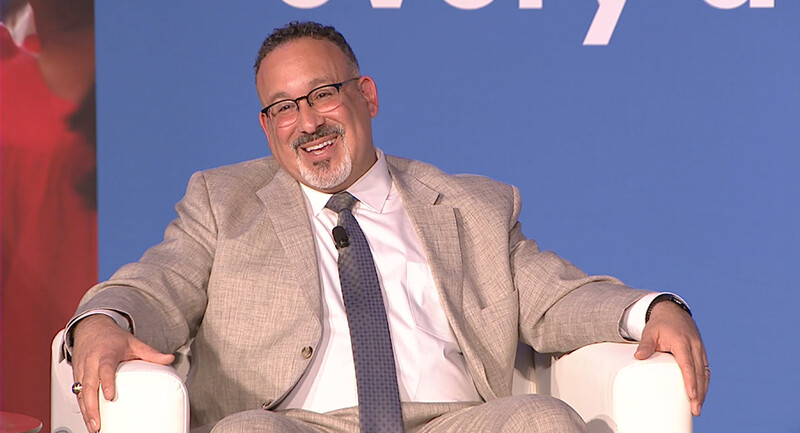As the campaign season enters its homestretch, it’s helpful to know where the national parties and their candidates stand on education issues. At their national conventions last summer, the Democratic and Republican parties adopted their platforms, identifying the issues and elaborating on their positions about topics like the economy, national security, and—of course—education. This information is being used for campaigning, but it’s also a guide for how the parties and their candidates will govern if elected.
As ASCD’s director of advocacy and government relations, I believe it’s essential for those of us committed to giving children the best education to know where each party stands on issues tied to education—both to inform our votes and to know what to look for once new leadership takes hold.
Below are excerpts from each of the parties’ K-12 education “planks” from their platforms. (Full platforms for both parties can be found at their respective party websites: www.democrats.org and www.gop.com.)
Educators
Democratic Platform: “Educators have always been heroes. The COVID-19 pandemic has made the value that educators provide to children, parents, and the economy obvious as never before to tens of millions of Americans. Public school educators should have the same rights to organize, join a union, and collectively bargain as private sector workers. Democrats will fight to significantly increase pay and benefits for all educators, in order to help recruit, retain, and reward high-quality teachers and support professionals, and will continue to support measures to help teachers pay for out-of-pocket classroom expenses. We will support programs to help introduce high school students to the teaching profession, enable school support staff to climb the professional ladder within schools, and recruit a diverse educational workforce.”
GOP Platform: “We applaud America’s great teachers, who should be protected against frivolous lawsuits and should be able to take reasonable actions to maintain discipline and order in the classroom. Administrators need flexibility to hold accountable all those responsible for student performance. . . . We urge school districts to make use of teaching talent in the business community, STEM fields, and the military, especially among our returning veterans. Rigid tenure systems should be replaced with a merit-based approach in order to attract the best talent to the classroom.”
Charters/Choice
Democratic Platform: “Students should have multiple public school pathways to be able to access the opportunities they deserve. Democrats will work to expand access to career and technical education, magnet schools for science and the arts, International Baccalaureate programs, and early college high schools to offer multiple pathways to meet the diverse needs and interests of America’s high school students. . . . Democrats believe that education is a public good and should not be saddled with a private profit motive, which is why we will ban for-profit private charter businesses from receiving federal funding . . . We support measures to increase accountability for charter schools, including by requiring all charter schools to meet the same standards of transparency as traditional public schools, including with regard to civil rights protections, racial equity, admissions practices, disciplinary procedures, and school finances. . . . Democrats oppose private school vouchers and other policies that divert taxpayer-funded resources away from the public school system, including the program at issue in the recent Espinoza decision.”
GOP Platform: “We support options for learning, including home-schooling, career and technical education, private or parochial schools, magnet schools, charters, schools, online learning, and early-college high schools. We especially support the innovative financing mechanisms that make options available to all children: education savings accounts (ESAs), vouchers, and tuition tax credits.”
Curriculum and Instruction
Democratic Platform: “Democrats believe we must prioritize STEAM education and funding for underrepresented students, including students of color, girls, and low-income students, to help remove enrollment and achievement barriers. We will equip students with the knowledge and skills to understand complex scientific issues, counter the rising tide of denialism by promoting environmental and climate literacy, and reverse the Trump Administration’s cuts to the National Environmental Education Act. In addition to developing strong literacy, numeracy, and STEAM skills, our education system should develop the deep learning and life skills needed to thrive in the 21st century economy, including critical and creative thinking, leadership, and judgment and decision-making.”
GOP Platform: “We likewise repeat our long-standing opposition to the imposition of national standards and assessments, encourage the parents and educators who are implementing alternatives to Common Core, and congratulate the states which have successfully repealed it. . . . A good understanding of the Bible being indispensable for the development of an educated citizenry, we encourage state legislatures to offer the Bible in a literature curriculum as an elective in America’s high schools. . . . To ensure that all students have access to the mainstream of American life, we support the English First approach and oppose divisive programs that limit students’ ability to advance in American society. We renew our call for replacing ‘family planning’ programs for teens with sexual risk avoidance education that sets abstinence until marriage as the responsible and respected standard of behavior…We strongly encourage instruction in American history and civics using the original documents of our founding fathers.”
Funding
Democratic Platform: “Each year, the United States spends $23 billion more on schools in predominantly white districts than in non-white districts. Using property taxes to fund public K-12 schools results in inequitable treatment for students in low-income school districts, compared to those in wealthier areas. Democrats are committed to closing the school funding gap by tripling Title I funding, which benefits schools that serve low-income students, and incentivizing states to adopt progressive funding formulas that direct resources to the schools that need it most. We will also ensure sustainable, reliable funding for rural schools, schools in impoverished urban areas impacted by gentrification, and Bureau of Indian Education schools. . . . We recognize the need for significantly increased funding and support for English learners to ensure they can participate meaningfully and equally in school…We will fully fund the Individuals with Disabilities Education Act and fully implement its requirements for a free appropriate public education and least restrictive environment.”
GOP Platform: “The United States spends an average of more than $12,000 per pupil per year in public schools, for a total of more than $620 billion…Of that amount, federal spending amounted to more than $57 billion. Clearly, if money were the solution, our schools would be problem-free. More money alone does not necessarily equal better performance. . . . In sum, on the one hand enormous amounts of money are being spent for K-12 public education with overall results that do not justify that spending level. On the other hand, the common experience of families, teachers, and administrators forms the basis of what does work in education.”
Thomas Jefferson said a well-educated electorate is necessary for democracy. We encourage you to read the full platforms and conduct your own research. ASCD doesn’t endorse candidates or political parties, but we do urge educators, and indeed all eligible citizens, to exercise their civic opportunity to register and vote.








